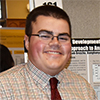Transition to Online Instruction: Interviews
With courses being delivered remotely for the remainder of the Spring 2020 semester, we asked some Chemistry faculty and students how it is going so far:

Suzanne Bart
Professor – Inorganic Chemistry, Associate Head of Graduate Education
Course: CHM 647 - Transition Metal and Organometallic Chemistry
“The first week went very smoothly for me. I’m teaching a graduate course and have made pre-recorded lectures, and posted them on my blackboard page. I also post handouts, problem sets, and any other course materials the students might need. This format allows the graduate students to work through the material at their own pace, so they can work around their other classes and TA assignments, which I’m sure have all changed formats too. It also works better for my schedule, as my children are home with me now. I can make the recordings when I have time without them, instead of being locked down to specific lecture times like during the semester.”

Dor Ben-Amotz
Distinguished Professor – Physical Chemistry, 2012 Murphy Teaching Award
Course: CHM 372 - Physical Chemistry, Enrollment: 130 students, mostly biochemistry and pharmacy majors
“I feel it is very important to continue offering students something resembling a live and direct communication experience. So, against most of the administrative recommendations, we are using WebEx to live-stream the lectures (and also record them for asynchronous access). So far things have gone pretty smoothly, although less than half the class has been logging in for the live WebEx broadcast. I spent the first full online lecture introducing the topic of quantum mechanics and telling some of my favorite crazy stories about the people that played a key role in its development in the late 19th and early 20th century. I had some problems with noise from my mic when it rubbed against my shirt, but other than that everything went pretty smoothly.”

Jacob Brejcha
Junior Undergraduate Student
Courses: CHM 241- Intro Inorganic Chem, CHM 374 - Physical Chemistry, and CHM 513 - Chemical Literature
“I have moved home for the rest of the semester. In my opinion, at its currently capacity, online instruction cannot match the benefit of in-class instruction. Having the ability to ask questions during and after lectures while they are still at the forefront of my attention is useful for me. Nevertheless, I feel like my chemistry professors have done an admirable job transitioning my classes to purely online formats. They have heeded students’ concerns and have tried to keep the classes as normal as possible.”

Jean Chmielewski
Alice Watson Kramer Distinguished Professor – Organic Chemistry/Chemical Biology, 2010 Murphy Teaching Award
Course: CHM 25500 - Organic Chemistry, Enrollment: 135 students
“First week is going well, I taped 3 weeks worth of lectures using Boilercast. My notes and the Boilercast videos are posted on Blackboard, and more than half of my class has already watched the first week's video. I have set up Webex for my office hour, and my Head TA has also used Webex for his office hours and our weekly recitation. So far so good!”

Alyssa Lambrecht
Senior Undergraduate Student
Courses: CHM 342 - Inorganic, CHM 374 - Physical Chemistry, and CHM 37401 - Physical Chemistry Lab
“As a senior, I am sad that my time at Purdue was cut short and working on classwork from home is not ideal. For both the classes I’m taking, video lectures were recorded online. For inorganic, they used Purdue Box to upload doc cam videos. This was nice because we could see the notes and follow along, however, we cannot see the professor so it is not very engaging. For homework, we submit pictures of the assignment to the professor and TAs. The downfall is we don’t get to see what we missed on the homework after it is graded.”
“For physical chemistry, our professor video records notes on an iPad. This is nice because you can follow along with the notes, but there is no way to speed up the video so it is slow to watch. It is nice being able to watch lectures on a faster speed.”
“Exams for both these courses will be online. Both have two hour time limits. This will be stressful because we have to pull up the exam online and submit pictures of it at the end, which takes time to scan and submit to blackboard. Some classes are open note on exams which will be nice because learning the content can still be accomplished with less stress on exam days.I am in physical chemistry lab and the last one of these labs will be done online (we only have 4 a semester). Labs will not be very engaging if we just have to look at data online and write a report.”
“For other classes, not having lab would take away the most important part, the hands-on work.The most difficult part of online classes is that during a lecture if something is unclear you cannot ask right away. For physical chemistry, we can post questions on piazza, but with so many integrals and derivatives it is hard to ask about specific problems. Being able to get help on problems and notes will be difficult and I am worried about that.”

Mark Lipton
Associate Professor – Organic Chemistry/Chemical Biology, 2018 Murphy Teaching Award
Course: CHM 26605 - Organic Chemistry (for Chemistry majors) Enrollment: 80 students
“I prerecorded my first week's lectures. So far, students seem to like them being Boilercast. I also have held two office hours with WEbEx. In addition, I am part of a GroupMe group devoted to my class that allows me to chat with the students interactively. So far, things have gone smoothly enough, but I'm still struggling to figure out how to write my next exam for remote learning.”

Jonathan Rienstra-Kiracofe
Associate Professor of Practice
Courses: CHM 12600 – General Chemistry II (taken by first year students intending to major in chemistry) Enrollment: 72; HONR-39900 – The Nuclear Age (interdisciplinary class taught for the Honors College, but also doubles as a “Great Issues” class for the College of Science) Enrollment: 19 students
“In CHM 12600, all lectures are pre-recorded. I write the lecture notes in Microsoft OneNote using a iPad with an Apple Pencil. As I write the notes, I use thee native iOS screen recording feature to capture the notes being written in real time and with an accompanying voice narration from me. These lecture recordings are uploaded to OneDrive into a online folder which is shared with the class. Students can stream the lecture recordings directly from this folder. This instruction is asynchronous (students can view the recordings at any time).”
“For labs, the Graduate TAs and I along with the Prep Lab have made short videos of us completing various components of the laboratory experiments. This includes performing the experiment and collecting data as the lab proceeds. The lab is presented to students on-line through Microsoft OneNote. The video segments are lined within the lab so that students may visually see the lab being completed. Students are then required to complete the lab analysis by using the data presented to them.”
“As far as office hours, the class TAs and I hold regular office hours during the week. These office hours are held as 'drop-in' video sessions through Microsoft TEAMS, which works similar to other video conferencing platforms, such as WebEx or Zoom.”
“In HONR-39900, the lectures are primarily discussion format based on readings and other materials. Due to the small size of the class and its normal afternoon meeting time (which avoids time-zone issues), the students are able to continue the usual lectures through synchronous video sessions. All 19 students in the class are able to attend the video session in Microsoft TEAMS.”
“Although the two class proceed on-line, the experience can never fully replace face-to-face interaction, especially for lab teaching experiments where students really need to interact with lab materials and instruments to learn proper laboratory skills.”

Marcy Towns
Professor – Chemical Education, 2013 Murphy Teaching Award
Course: CHM 11200 - General Chemistry (primarily College of Agriculture and the College of Health and Human Sciences students) Enrollment: 747 students
“We have been able to lean on our existing technology to drive our course forward using Blackboard, Piazza, and Bluedoor labs. We are using pre-recorded lectures posted on Blackboard so students can listen when it is convenient for them, and can pause, rewind, and listen again. We have posted on Blackboard short videos about how to solve problems related to the homework to provide more support for their learning. We post a short video each Monday with a weekly organizer to help students know what is coming up this week in CHM 11200!”
“We are using Piazza for office hours for the professors and teaching assistants. This platform allows students to anonymously ask questions and it threads the responses so students can easily find answers to commonly asked questions. The platform also allows students (again, anonymously) to ask questions at any time 24/7 so that our teaching staff can answer them!”
“Fortunately we were already using an online laboratory manual through Bluedoor labs thus the transition has been seamless, there's no transition to a different technology for the students and that has been a blessing for them. We are using a combination of lab videos prepared by our prep lab staff along with data sets to support laboratory learning in this remote environment. We post pre-labs, videos, data, and a laboratory report form in Bluedoor that the students complete just as they had been doing all semester long.”
“We identified a couple of students who live in rural Indiana and do not have sufficient WiFi to complete their coursework online. Although we started the first week by sending them the content on USB drives (thumb drives), the Provost's office has addressed this issue and now the students have devices that allow them to connect to the internet and complete their course work across classes.”

Ashley Varney
Senior Undergraduate Student, Teaching Assistant for CHM 112
Courses: CHM 538 – Molecular Biotechnology and CHM 342 – Inorganic Chemistry II
“I think it was best that my professors posted videos so class could be done asynchronously. It would have been hard for all 100 or so students to log on at once, and it is easier for students in different time zones so they don’t have to get up super early to watch. So far, my professors and TAs have been very communicative, and I know exactly what is expected of me. As a TA for CHM 112, I have also had good luck with voicing over PowerPoints as a way to present my recitations.”

Paul Wenthold
Associate Professor – Physical/Organic Chemistry & Mass Spectrometry, Associate Head of Teaching and Undergraduate Education
Course: CHM 26200 - Organic Chemistry (mostly for Chemical Engineers) Enrollment: 160
“So far, the first week has been smooth in CHM 26200. Then again, we haven't had any assignments for the students to deal with. That starts tonight. I had a few students show up at my first virtual office hour on Monday just to get some clarification on practices going forward, but that lasted about 10 minutes and since then no one has come to any office hours. Right now my lecture videos are all prepared through about April 17. I have broken my lectures into 3x15 minute videos for each class period. In the process I've learned new technologies (Brightspace) and I've learned new ways to use old ones (Blackboard).”
“I really do miss the interaction with the students, though. Although I've been able to communicate with them through office hours, email and twitter, I only know that I have reached those who respond, and if they don't respond, I don't know that they got the message. At least if they are in class when I make an announcement, I know they heard it. I've been tracking the student views of the lecture videos. Unfortunately, a large number of them have not been watching the lectures regularly. I have tried to discourage them from binge watching them (I think my comparison was something like binge-watching It's Always Sunny in Philadelphia or something like that). In the end, students will do what they feel is best for themselves, and, as instructors, we can't change that. I just hope I can give them enough resources to learn and succeed.”